#i enjoy it as a darkest dungeon game (characters‚ enemy design‚ combat for the most part) but i don't. think it meshes as a roguelite
Explore tagged Tumblr posts
Text
mixed feelings about dd2 but i do love that jester strikes a fruity little pose when he gets buffed
#i enjoy it as a darkest dungeon game (characters‚ enemy design‚ combat for the most part) but i don't. think it meshes as a roguelite#its just too slow and punishing for a genre that demands back-to-back replays and consistent growth#80% of upgrades are laughably minor and/or actively detrimental. so it's hard to feel like grinding out runs is worth it#the choice to lock character moves behind progression is especially baffling because it means everyone's kits feel half-finished and clunky#“but isn't darkest dungeon a series about being ground to dust in the maws of an uncaring universe” i mean sure.#but these issues don't make me feel nihilistic they just make me annoyed with the game design#also im still mad that they woobified all the characters. let them be actually morally dubious again. please.#except antiquarian i think antiquarian is perfect. keep stabbing me in the back queen i love you#beepbeep.txt#this time on: putting all my thoughts in the tags because making it the actual post feels too confrontational
14 notes
·
View notes
Text
Number 1: Darkest Dungeon
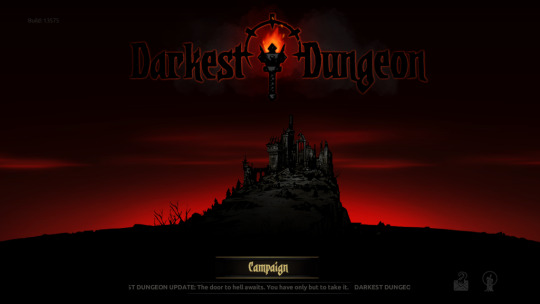
Ruin...has come to our family.
Every so often a game comes along that feels like it was made specifically for you. So it was with Darkest Dungeon. First off, the game’s art style is breathtaking, I’d never seen a game look quite like it. The heavy shading on the characters gives everyone a severe, mysterious look. The combat is turn-based, with the twist that skills and abilities are based on where the characters are standing in a formation. It invokes HP Lovecraft* and makes the emotional stresses of being sent into dangerous places to battle horrors and abominations into a gameplay mechanism. The music is great. There’s a cool, spooky narrator. There are a bunch of different classes, and a town hub to upgrade. Darkest Dungeon ticks...all of my boxes? Almost. Make the adventurers high schoolers who attend classes, form social bonds, and manage relationships during the day before fighting monsters at night and you’d have it.
youtube
I’ve played several hundred hours of Darkest Dungeon, and I still rarely skip the intro video when I launch the game.
The first time I saw the above video, I was immediately reminded of two things:
- Eternal Darkness, a Gameube game about exploring mansion of your recently-deceased uncle and discovering an evil book that has been passed down through the generations.
- Lurker at the Threshold, which was my first HP Lovecraft story.**
This is my kind of horror. I dislike blood and guts slasher horror, but I love cosmic horror. This is very difficult for most games to capture, a lot of Lovecraft-inspired games tend to be about fighting tentacle monsters with tommy guns. And Darkest Dungeon is about fighting cool scary monsters, but Red Hook implemented a system in which your characters will have to deal with the psychological toll that living through life-threatening encounters with unspeakable horrors would take on a person.
It’s easy to boil this down to just another meter to manage. “Oh, this monster monster used an ability which inflicted 6 points of stress on my Crusader, he is only 13 stress points away from his limit.” Most games can be boiled down to their mathematical skeletons. This is where the game’s incredible writing, art direction, and voice acting come through. Combat actions are often accompanied by a line of dialogue written over a character’s head and/or a line from the narrator (the excellent Wayne June).
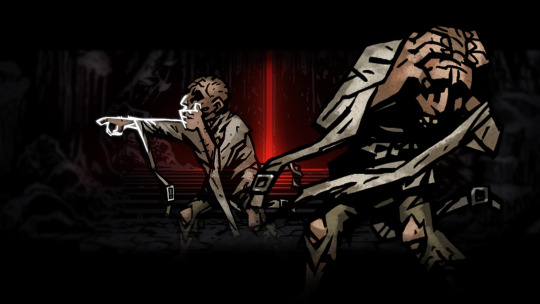
For example, you encounter an enemy called a Madman - a fairly disturbed fellow in a loose straightjacket. One of his attacks his one of your party members, inflicting stress and a debuff. How this looks in practice is like this: this dude in an unbuckled straight jacket who has been holding his head in his hands suddenly points and screams something muffled with one hand over his mouth. One of your party member’s screams “I-I don’t want to die here!” and the narrator says “Gasping...reeling...taken over the edge into madness!” The imagination doesn’t have to wander far to picture this distraught man suddenly pointing at you and screaming something he can’t possibly know about you. This marriage of theme and mechanisms is something that makes video games special.
As someone who has always enjoyed the math puzzle-like nature of turn-based combat, Darkest Dungeon managed to somehow feel both familiar and innovative. Having combatants lined up from left to right seems like such a simple thing, but it brings into a play a whole layer of strategic considerations. There are abilities that can only be used from certain positions, or can only hit specific ranks on the enemy side; there are abilities that push and pull, that lunge forward or fall back. On any given delve, you are choosing a party of four from 17 classes, each of which has an assortment of abilities to choose from. Early in the game you can kind of get by with whatever party you choose, but as the difficulty ramps up you have to really think about your party makeup before setting out.

Darkest Dungeon’s late game features a fairly brutal difficulty spike. Most of my plays of the game are me having a laid back good time with the game until I get my ass handed to me in a few Champion dungeons, then putting the game down for months before starting a new save. This understandably turns a lot of players away from the game. Shit can go wrong in a hurry. Shit WILL go wrong in a hurry. If the enemies focus on a specific character and/or get a couple of critical hits in succession, you can lose party members permanently, and those setbacks can be deflating. You can’t avoid bad luck, but you can mitigate it and plan for it. And overcoming an “unfair” challenge is exhilarating.
One of the things the game does brilliantly is give you those hopeless situations and occasionally offer a beacon of hope. This is by way of the game’s stress and affliction mechanism. When a hero’s stress level reaches 100, they will either become afflicted with a negative trait such as Paranoid or Abusive, or they will become virtuous, gaining a trait such as Stalwart or Focused. This seems to be tilted in favor of affliction about 70/30. Either way, this event is accompanied by a line of text from the character, and a callout by the narrator.
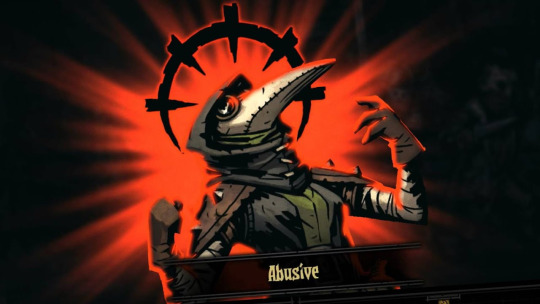
In the case of an affliction, things go from bad to worse. Characters will change positions on their own (a fearful character will move back in the formation, or a masochistic one might move toward the front) or skip their turn altogether (if they’re hopeless). Afflicted characters will stress the rest of the party out as well whether it’s by being mopey, or verbally abusive - a paranoid arbalest who misses a shot will say “WHICH ONE OF YOU BUMPED MY ARM!?” and so on. On the other hand, sometimes when hope seems lost a character will become virtuous. They will shout encouragement, grant buffs and healing and the such.
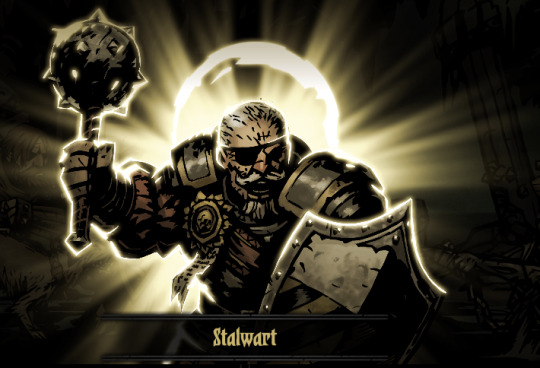
The game’s other big source of drama comes from its death’s door mechanism. When a character reaches zero health, they do not die. Instead they are in a state called death’s door, which means that any damage they take while at zero health could kill them. This leads to every attack being accompanied by held breath and a tightly clenched asshole. The game’s design lends it so much personality and breeds so many memorable stories.
As impressive as the game’s design is, it is matched by the game’s sound design. Stuart Chatwood did an incredible job with the score. The music is deeply unsettling, a low thrum while you make your way through poorly lit dungeons where traps lie in wait and horrors potentially lie around every corner. Distant howls and screams help set the stage. The battles themselves are against pounding drums and upsettingly realistic sounds of blows landing and gasps and chokes.
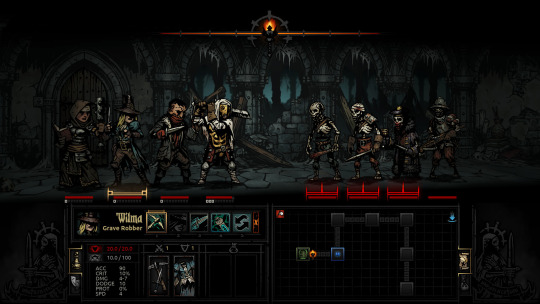
Wayne June’s contribution as the narrator cannot be overstated. He is the heart and soul of Darkest Dungeon. Hs voicework captures the game’s dark humor, hope, despair, triumph and everything between. I cannot envision this game without him, and was thrilled to learn that he has signed on for Darkest Dungeon II.
It’s a game of long odds, despair, determination, and triumph. As someone who lives with depression, the game probably means more to me and hits me differently than most. The idea of throwing yourself headlong into a situation that seems hopeless, falling into despair, then getting back up and going again means something to me. The game brought tears to my eyes the first time, when a hero hit their stress limit and became Stalwart rather than afflicted, I heard Wayne June deliver the line “Many fall in the face of chaos. But not this one. Not today.”
Darkest Dungeon isn’t the best game ever made by any metric, but it’s my favorite.
*I’ve managed to make peace with enjoying Lovecraft’s fiction while being aware of what a racist, xenophobic shit stain he was
**Technically more August Derleth than HP Lovecraft I know.
4 notes
·
View notes
Text
Dark Alliance Reminds Us We Need a Lord of the Rings: The Two Towers Remaster
https://ift.tt/3zPHhNB
The verdict on the recently released Dungeons and Dragons: Dark Alliance is still being decided as fans and critics finally get their hands on the highly-anticipated Action-RPG, but you’re not alone if the mere thought of the game has you dreaming of a Lord of the Rings: The Two Towers remaster.
Released in October 2002 (a couple of months ahead of the film it shares a name with), Lord of The Rings: The Two Towers was a hack and slash action game eventually available for PlayStation 2, Xbox, and GameCube as well as Game Boy Advance and even cell phones. The story goes that publisher EA and developer Stormfront Studios were supposed to make a similar game based on Fellowship of the Ring, but in 2001, all parties involved realized that the game wouldn’t be finished in time for the movie’s global release. As such, the work that had gone into that title was carried over to an adaptation of The Two Towers.
We have to stop there for a second. See, it’s pretty hard to separate the Two Towers game from the Lord of the Rings films, and not just for the positive reasons you probably think of when you remember that game. While 2002 wasn’t quite the darkest time for video game adaptations of TV shows and movies, many gamers had been burned by half-hearted adaptations too many times before to be inherently excited about the idea of “living the movie” that we were still being sold on. There were some circles in which the mere mention of a Lord of the Rings game based on the beloved movie drew hesitant sighs and concerned groans.
cnx.cmd.push(function() { cnx({ playerId: "106e33c0-3911-473c-b599-b1426db57530", }).render("0270c398a82f44f49c23c16122516796"); });
However, you also have to understand just how big The Lord of the Rings was at that time. Prior to Fellowship‘s premiere, the odds were good that you either grew up with the books and thought there was no way that the movies could do them justice, or you had never read the books but were feeling cynical about the idea of another franchise blockbuster after The Phantom Menance. In either case, what many of us saw when we first saw Fellowship of the Ring could only be described as magical.
The Two Towers obviously benefited from its association with a property that had ignited the imagination and spirits of film fans across the world, but one of the most fascinating things about the game wasn’t just that it would feature levels, characters, and footage from 2001’s Fellowship of the Ring but 2002’s The Two Towers as well. That meant Two Towers players would actually get to see and play parts of The Two Towers movie two months before it was released in theaters for a global audience.
It was kind of a gimmick, but it was a great one. Much like Enter the Matrix, The Two Towers initially sold itself on the promise of not just letting us dive into a world we loved but actually showing us parts of that world we hadn’t seen before. For a generation in awe that was still processing the grandeur and impact of Fellowship of the Ring, this was more than we could have ever dared ask for. It would have been enough if the games treated the source material with respect (which they did) but to offer us a preview of the movie we stayed up at night thinking of? It was an idea so far beyond what so many of us wanted: an excuse to be in that world for just a little longer and maybe even have our own adventure while we were there.
Yet, when I think back on the Two Towers or hope for a re-release, I rarely dwell on the ways that the game innovated. Honestly, I more often find myself thinking back on the ways that the game was so wonderfully simple and even familiar.
Read more
Games
The Lord of the Rings: Gollum Trailer Showcases “Prince of Persia” Style Stealth Game
By Matthew Byrd
TV
Lord of the Rings Amazon Series Resumes Production in New Zealand
By Joseph Baxter
Honestly, there’s not a lot that separates Two Towers from Double Dragon, the Teenage Mutant Ninja Turtles arcade games, and so many beat ’em ups of the golden era of that genre. In all cases, the premise is rather simple. You walk across linear, but often beautiful, levels and mash a few buttons to wail on the various enemies in your path. You may have to throw in a special attack here and there (and Two Towers utilized a basic character upgrade and experience system for good measure), but the formula is pretty much the same as it ever was.
Compared to something like 2001’s Baldur’s Gate: Dark Alliance, Two Towers was almost comically simple. In fact, I can remember some at the time referring to the game as a watered-down version of those more Diablo-like experiences. Honestly, it wasn’t an entirely unfair criticism if you were determined to stack those games side-by-side based on a few similarities. Games like Dark Alliance offered dozens (or more) hours of rich action-RPG gameplay in lush fantasy settings, and Two Towers could be beaten in a handful of hours with relatively little skill or effort.
Furthermore, it always felt a bit strange to boil The Lord of the Rings down to action sequences. The movies absolutely took the action scenes from the books to a new level, but the games made little to no effort to recreate or expand the more subtle storytelling and character-building elements that really made the books and movies everything they were. Just about any modern critique of The Two Towers game written by someone who has no nostalgia for the game would likely (and perhaps rightfully) focus on the game’s simple combat, abbreviated storytelling, and all-around basic nature.
Years later, though, that’s actually the aspect of the game that I feel has aged best throughout the years. I could rant about how Two Towers‘ short, sweet, and complete design is a breath of fresh air compared to the onslaught of open-world games that seem to secretly want to be live service titles, but the beauty of The Two Towers isn’t the idea it’s somehow this bastion of noble game design. It’s more about how it so perfectly represents the idea that a good beat ’em up never really grows old. From the original genre innovators to modern throwbacks and even those titles that tried to do a bit more with the genre (such as Rockstar’s brilliant The Warriors), these games offer a kind of simple pleasure that sadly seems to be harder to justify at a time of escalation in game production.
Mostly, though, fond memories of The Two Towers are rightfully often rooted in the thrill of experiencing a loving tribute to the early Lord of the Rings movies with friends. It’s been said that it’s easier to make a game where the joy of playing with others allows you to overlook game design elements that would otherwise bug you, and maybe there’s some truth to that. Even negative reviews of Dungeons and Dragons: Dark Alliance published so far tend to mention that the game can still be a good time when played with others. It’s just more fun to play with friends, and you could certainly argue that there have been game developers who rely on that quality to sell games that would otherwise be unappealing.
The thing that’s easy to love about Two Towers is how openly it embraces that philosophy. The game isn’t trying to be much more than it is by forcing in systems and mechanics that ultimately bloat what the game actually does so well. Just about any gamer of any skill level with a friend by their side, an extra controller, and a love for The Lord of the Rings movies can hop into Two Towers and experience exactly what that game was meant to provide: a simply fun time designed to make you celebrate this thing you love and not feel exploited.
That’s what makes the fact that we’ll probably never get a remaster or remake of the Two Towers (or its exceptional follow-up, Return of the King) due to the complicated nature of the licenses involved so upsetting. WB mostly controls the rights to Lord of the Rings games now, and even if they were willing to allow EA to remaster or remake these games, it’s not entirely clear how that process would work or how much of the original games’ film footage and “DVD” extras could be retained. It’s always tragic when licensing gets in the way of our ability to enjoy a gaming experience, and it’s especially sad when licensing impacts our ability to enjoy a game that not only celebrated its license but gave many of us reason to believe in licensed games again.
Yet, I refuse to give up hope. As we near the 20th anniversary of Fellowship of the Ring later this year and the 20th anniversary of The Two Towers‘ game next year, now feels like the perfect time to revive these classic hacks and slash beat ’em ups. Without them, a new generation of Lord of the Rings fans must rely on dwindling backward compatibility support and emulations just so the idea of a simply enjoyable Lord of the Rings game easily shared with friends doesn’t go from history to legend and legend to myth as much that once was in gaming becomes lost.
The post Dark Alliance Reminds Us We Need a Lord of the Rings: The Two Towers Remaster appeared first on Den of Geek.
from Den of Geek https://ift.tt/35L7sra
0 notes
Text
My Top 10 Games of 2016
Man I'm glad 2016 is over but the games were good...
Some years play rough and 2016 was one of those years and I am very happy for it to be over. On the other hand in terms of video games, and only video games, this was a really great year. From a really solid resurgence in the quality of triple A shooters, to the Juggernaut that was Overwatch, and some really solid indie releases, there were actually too many good games for one person to play. Also there was a massive update to DotA 2 this year which is always welcome. So here we go, my top ten games of 2016.
Honorable Mention - The Final Station
Of all the games I played this year I had the most intense reaction to The Final Station. Upon completion of this game I set aside my controller, turned off my monitor, not the PC, just the monitor, then I went for a walk around the block. I was moved to this act not by any great aspect of the game’s production or by some jaw dropping set piece but instead by the oppressive weight and bleakness of The Final Station’s world. A dangerous world where even the simplest task can expose you to being torn apart by brutal attackers. A world where infrastructure is crumbling and the people normally trusted with protecting everyone have secretly betrayed the trust of the people. After the way 2016 played out, the bleak outlook of The Final Station resonates even more.
10 - Pokemon Go
I am not a Pokemon fan. I fully recognize the good and great qualities of the Pokemon universe, but the games and cartoons have just never done much for me. The runaway success of Pokemon Go demanded that I give the game a shot despite my usual lack of enthusiasm. What I found was a really solid AR experience filled with tons of excuses to get me up and about in the real world and a great new icebreaker to start conversations with people I would otherwise have nothing in common. Oh yeah, and some weak ass Pokemon.
9 - Reigns
Reigns is a truly fantastically simple game. Of the two mobile games on this list Reigns is the one that fit into my life the best. In that way Reigns was the anti Pokemon Go; Pokemon Go was the mobile game that changed my routine and Reigns was the game that fit into my routine. When you’re waiting in line for the movies or whatever you can’t go running after that stupid Zapdos. But you know what you can do? You can live the lives of half a dozen Medieval Kings, you can meet the devil in the form of you dog, you can fight skeletons in a dungeon, and even more cool stuff. Also it’s a mobile game that you just pay for up front and it never bothers you for money again, which is always nice.
8 - Darkest Dungeon
Fun fact: for most of my 2015 Extra Life Marathon I was having internet service issues and about the only game I could reliably stream was the early access version of Darkest Dungeon, so I have more than a little experience with the game. The way that every part of The Darkest Dungeon works together to to create a gothic horror landscape is just fantastic. The way the cartoony artstyle contrasts with the animation and sound design is just dissonant enough to be unsettling. The way that the psychological maladies effect the gameplay and can just straight up end a dungeon run or in some cases even end a game is a risky gamble that really adds a sense of tension that works incredibly well with the tone of the game. Ultimately Darkest Dungeon is a really great, creepy, game. Be ready to grind a bit though because you'll definately need to.
7 - The Banner Saga 2
In a year when the second entry in the XCOM franchise was a disappointment there was a shining star in the turn based strategy genre and that star was The Banner Saga 2. Where XCOM 2 made the mistake of assuming players had maintained their skills from the first game The Banner Saga 2 eased players back into the combat system with a few easier battles before dialing up the difficulty. It also doesn’t hurt the game that it has some of the best hand drawn style art and animation of any game ever. Bottom line: The banner Saga was the best turn based strategy game released this year and I really like that type of game.
6 - Overwatch
I really enjoyed my time with Overwatch this year. Zarya is top tier A-plus defensive tank, and is also just the best. The way that Blizzard has built not just a great multiplayer game but also the UI framework around that game which celebrates every player’s contribution is a great accomplishment. I think that the characters in Overwatch are all really fun as is the game itself. It’s just a shame that there’s really no good single player experience in the game and that the story exists entirely outside the game, and that the community for that game is becoming toxic in spite of some masterful design efforts to combat that. Also shameful is Blizzard's decision to add the worst free to play practice, blind loot boxes with repeats, to a full price retail game. Overwatch is a really great game that is slowly getting worse over time and that’s kind of sad.
5 - Dark Souls 3
Dark Souls 3 is my first Souls game so I was unprepared for the absolute savagery with which this game assails players, even in the tutorial. Once I played for a while, though, patterns began to reveal themselves and a game that seemed ferocious at first became simply challenging but fair. The appeal of Souls games was lost on me for a long time. I couldn’t understand why people were so excited to play blatantly unfair games. Now that I’ve played one I understand that these games aren’t really unfair or even onerously difficult. Souls games simply operate at a different tempo from other games and learning that tempo is the really difficult part of mastering them.
4 - Stellaris
Just. One. More. Turn.
Getting you to say that after 8 hours is the ultimate goal of all games like Stellaris. What Stellaris offers you that others like it don’t is freedom. Freedom to design your own civ, freedom to find your own way to win the game, freedom to be weird. Games like Stellaris, most notably the Civ series, tend to force players into a few basic strategies. Sure you can try a pacifist playthrough in a Civ game but good luck actually winning or even surviving very long that way. Stellaris has a way of making all playstyles viable by making them all just flawed enough that really drew me in to an extent greater than any other game I played this year. That said I tend to be fairly biased in favor of this type of game in general so it’s not a huge surprise that it affected me this way.
3 - Doom
Doom is a game about momentum which is important because that is the way it is different from practically every other game this year. The new hotness in games lately has been agility; letting players flit about the environment hither and thither. Doom ignores this trend, almost with disdain, forcing players to keep their feet mostly planted on the ground but letting them move at unheard of, in recent years, speed across it. What this means is that Doom isn’t a game about not getting blasted so much as it is a game about blasting things. The whole point of the game is to treat enemy encounters the way the Kool-Aid Man treats walls. This isn’t just a return to form to the series because this year’s DOOM added a new piece to the old formula; storytelling. In DOOMs of yore story was an afterthought for the most part. This DOOM, though, actually has a story with a plot and everything and actually interesting supporting cast members. This game even managed to give the “Doom guy” a little bit of a personality and for that alone it will go down as maybe one of the best shooter campaigns ever. In a year where the most popular game is often about five opposing team members finding ways to keep you from killing the sixth Doom is a breath of fresh air, letting you really cut loose against a horde of angry demons released by the worst kind of short sighted corporate greed.
2 - Hyper Light Drifter
I’ve said this a lot this year and I’m going to keep on saying it, because apparently it needs to be said. Everyone, play, Hyper Light Drifter. As a medium video games are often criticized, occasionally correctly, for being too over the top. With that being the case Hyper Light Drifter is possibly the exception that proves the rule. Which is to say sublimely simple and quiet but also incredibly fun and engaging. It doesn’t hurt that the game has the what is probably the best pixel art and sprite work in a game since Fez, an amazing synth heavy soundtrack and great sound design overall. The real beautiful aspect of Hyper Light Drifter, though, is the gameplay, specifically the combat. Few things this year have been more satisfying than mastering the combat in Hyper Light Drifter. The combat is just different enough from other similar games to be challenging while being familiar enough to not be off putting. But more than anything about the game it is the quiet tone of Hyper Light Drifter that impressed me. So what are you waiting for. Go play this game!
1 - Titanfall 2
Titanfall 2 is a truly magnificent accomplishment in game design and execution. Every bit of the game is impeccably well done, it looks and sounds amazing, plays like a dream and most importantly is a joy to play. While a lot of games have the kinds of traversal mechanics that Titanfall 2 has, nothing feels like Titanfall 2. That is what makes this the best game of the year, the way it feels. More than any other aspect of the medium, feel is what defines and differentiates games. In a year where great games were built to make you want to gamble on a loot box or increase accuracy of your favorite GPS app, the relative purity of Titanfall 2 makes it stand out. Instead of trapping players in a restrictive character class Titanfall 2 lets people customize almost every aspect of their multiplayer loadout. The game is even more distinctive on account of its campaign, remember those, which is a masterclass in how to pace mechanics. Titanfall 2 is constantly introducing and discarding new, interesting gameplay mechanics and consequently never gets dull or repetitive. When the mechanical brilliance of the campaign is put together with Titanfall 2’s solid “A boy and his robot” story and one of the year’s standout new characters, BT 7274, and you get, arguably, the best campaign of the year.
As parts of video game industry more and more often leave out parts of their games so they can sell them to us later or add sleazy free to play hooks to games they also expect us to pay for up front, it becomes important to celebrate games for simply being complete experiences on release. Unlike some games on this list Titanfall 2 is at that and more, the best game of the year.
#Titanfall 2#Hyper Light Drifter#DOOM#Stellaris#Dark Souls 3#Overwatch#The Banner Saga 2#Darkest Dungeon#Reigns#Pokemon Go#The Final Station#Top 10#Game of the year
1 note
·
View note
Text
Game of the Year 2016: Has There Ever Been a Better Time to Play Video Games? The Answer May Surprise You!
This article has also been posted to my blog on the website Giant Bomb. You can read it there as well if you’d like.
Hey, internet. You might remember me from such hit gaming crit pieces like the game of the year list I wrote last year, or the 0 other things I wrote about games because I’m a lazy idiot and I didn’t have the time or energy to write anything else in the time from then till now. Woops. I meant to write more, I swear.
Anyways, a lot of bad, scary shit happened this year and I’m sure if you possess both a heartbeat and the ability to understand communication about the outside world you know that already, so attempting to address any of that in a silly video game ranking list seems like a bad idea. But if we were to judge 2016 purely by how good its video games were (which, as we all know, is the only metric that matters), I’d say 2016 was a pretty good year.
So good, in fact, that I kind of feel bad that I either didn’t even get the chance to play certain games, or that I wasn’t as into certain other games that others seemed to love. Sorry, DOOM, I just don’t love you the way everyone else does. I appreciate your tongue-in-cheek tone, fast-paced action, and the mere fact that a critically acclaimed Doom game exists in 2016, but you just didn’t click for me. Sorry Civilization VI and Dark Souls III, you both surprised me that I actually liked you, given that I didn’t care for Civilization V or any of the other Souls games, but you’re both unfortunate victims to me just plain liking other games better than you. And finally, sorry to Planet Coaster, Thumper, Titanfall 2, Brigador, Watch Dogs 2, Darkest Dungeon and probably a few more I’m forgetting. I just didn’t have the time and/or money to get to play much of any of you. I probably would have liked at least a few of you if time and money weren’t obstacles.
But enough doom and gloom and apologia. It’s time to get to the games I enjoyed the hell out of in 2016.
11. Death Road to Canada
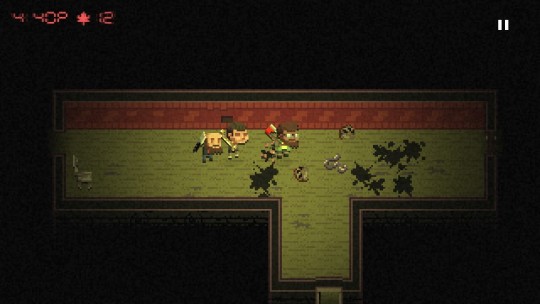
Adding Death Road to Canada to this list feels a bit weird to me. Not because I don’t enjoy it – I do, quite a bit, actually. It’s just that despite how much I enjoy my time playing it, it’s a hard game for me to recommend.
For those of you that don’t know what the game is, the premise is as follows: After a zombie apocalypse destroyed most nations on Earth, only Canada exists as a last bastion of uninterrupted civilized life. You play as a group of up to four either custom made, randomly generated, or rare special event survivors as you make your increasingly difficult trip through generic American towns seeking shelter in Canada. Throughout your trip, you’ll fight off zombies, gather supplies, build your survival skills up, and try to have your group of survivors not kill or double cross each other. It’s essentially Oregon Trail but with zombies (and way better than the other game that tried to do the same thing).
Despite the premise, the game is pretty goofy, with jaunty 8-bit rockabilly tracks and humorous dialog and events littering the death road. Which is actually one of the first reasons I might not recommend it for everyone, actually. The comedic writing hits more than it misses, but when it misses, boy does it miss. Between its actually funny original writing there’s the occasional joke that’s referential for the sake of being referential, as well as enough jokes about Canadian stereotypes that it’s actually occasionally grating.
The combat in it could also be better. It’s essentially one button to attack, with your character’s effectiveness with their weapon of choice (as well as their stamina and ability to repeatedly use it, if it’s a melee weapon) being based on said character’s stats. It works, but it might be a bit too shallow for some.
But despite that, I still really, really enjoyed most of the time I spent playing this game this year. The game’s RPG mechanics are actually surprisingly well done, with much of your characters’ stats being initially hidden until it actually comes time for them to use them. The random events that happen between resource gathering missions are usually pretty funnily written and occasionally oddly humanizing in their pettiness, involving things like arguments over who let a nasty fart rip in the car, or what song to play on the radio. Sometimes, some of your characters will even be bummed out if you do something good like help other survivors with no reward if they’re assholes. It’s things like that that give the game its real charm and appeal to me, and what gets me invested in making sure my group of survivors makes their way to Canada.
I’ve already written way more than I expected to about this game, so I’ll close by saying that despite the relatively low amount of songs in the game’s soundtrack leading it to be a bit repetitive, what’s in there is pretty stellar. This one in particular is my favorite.
10. Superhot
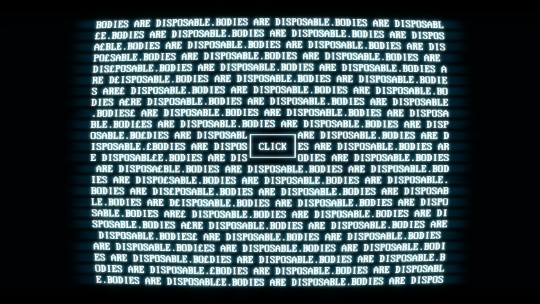
Superhot is probably one of the most stylish and cohesive games I’ve ever played. It’s very short, but only because it doesn’t need to be any longer. It busts down your door, delivers a gut punch of stylized hyperviolence, then puts a shotgun under your chin and blows your head off with its unexpectedly off-the-wall narrative, leaving you shattered in pieces by the time it’s done like the many red, featureless enemies featured throughout the game.
In other words, Superhot is the most innovative shooter I’ve played in years.
9. Dragon Ball Xenoverse 2
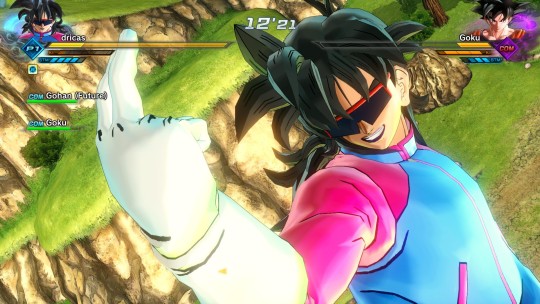
For me, Dragon Ball Xenoverse 2 is the video game equivalent of comfort food. I’ve already stated in my list last year for the previous installment in this game series how I have a kind of nostalgia for Dragon Ball Z, fueled by how often I watched it with my brother when we were kids. Playing Dragon Ball Xenoverse 2 takes me back to the show’s overly dramatic storylines and over the top battles that are endearingly cheesy to watch as an adult.
But this sequel has quite a bit more going for it than pure nostalgia factor. The mission structure feels much more smartly designed than its predecessor. I’ve also felt like there’s just overall more to do in this sequel than I did with the last game. I’m not sure if there’s actually more side quests or if the game has just guided me through all it has to offer better than the last one did, but the end result is the same.
Sure, the combat is still pretty button mashy, but that almost feels appropriate to the source material. Dragon Ball Xenoverse 2 isn’t the deepest fighting game ever (and probably not even a fighting game at all but I don’t give a shit about that argument at all), and I don’t know if someone who doesn’t have at least a bit of reverence for the Dragon Ball universe would enjoy playing it, but none of that matters to me. It makes me feel all warm and happy inside when I play it and I love it for that.
8. Pokémon Moon
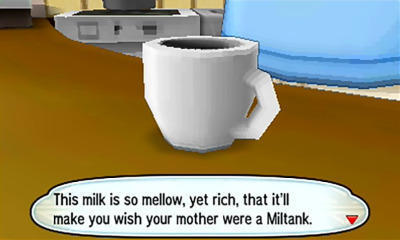
Despite considering myself a fan of the Pokémon franchise, I haven’t played most of the Pokémon games. My first was Pokémon Red/Blue when I was a kid. Being a certified 90’s Baby™, I was the perfect age to fall in love with both that game and the cartoon that spawned from it.
After I stopped watching the show or caring about the first game, I lapsed on playing any Pokémon games all the way until Pokémon X/Y came out a few years ago. While I enjoyed that game for what it was, in a lot of ways it felt like it was clinging onto to a few old design decisions, either out of complacency or some misguided notion of what a game in the series should be. I kind of checked out on playing it before I beat it, likely because of how clunky it could be at times.
With Pokémon Sun/Moon, it feels like Game Freak has learned this lesson and made the game feel a lot more like a modern video game, at least for the most part. There’s still a few weird clunky bits and questionable design decisions here and there (I’m looking straight at you, theoretically infinite calling-for-help mechanic), but overall, it’s much more pleasant to both navigate and play. For example, once you battle an individual Pokémon at least one time, the next time you battle the same type of Pokémon, the game will tell you which of your moves will be super effective, effective, or not effective. Quality of life improvements like that have gone a long way in improving my experience with the game.
The game’s fake Hawaii setting of Alola is also a really pleasant place to be. Everything about it from the music to the palm trees and tropical clothing make the game just feel chill, man. It’s an inviting world that was a joy to visit every time I launched the game this year.
Also Team Litten 4 lyfe
7. Stellaris
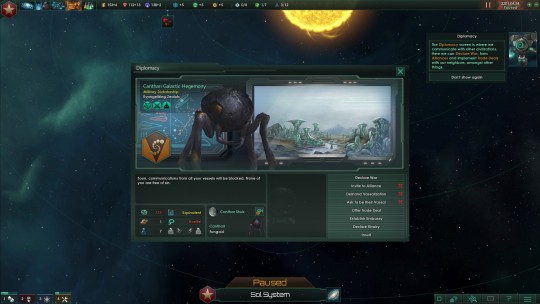
I’ve been a huge fan of the Paradox style of grand strategy games ever since Crusader Kings II stole many hours of my life a few years ago. Since then, I’ve spent countless more hours in Paradox’s other offerings, such as Victoria II and Europa Universalis IV. But despite how much I enjoyed their more historically-oriented offerings, I always felt like they could apply this formula to more fantastical settings.
So needless to say, when Stellaris was announced, I was super excited for it. So much so that it almost feels like a bit of a disappointment that it’s not higher (lower? How do lists work) on my list. A relatively shaky launch marred with an almost nonexistent midgame and a few technical issues soured me a bit on the game initially.
That being said, after a few post-release patches addressing this and a few other balancing issues, the game feels like it’s most of the way to where it should be. The political ethos system you can set for your race at the start of the game is the perfect springboard for thinking about how you want to roleplay your empire, which has been the most enjoyable part of the game for me. It’s easy to get lost for hours playing the game and tackling any issues that come your way how you think your empire would handle them, not necessarily how you would personally handle them.
I still wish the game had the political and economic complexity of Victoria II and the depth of character of Crusader Kings II, but nonetheless Stellaris has been another Paradox grand strategy title worthy of the hours it’s sucked from my life.
6. My Summer Car
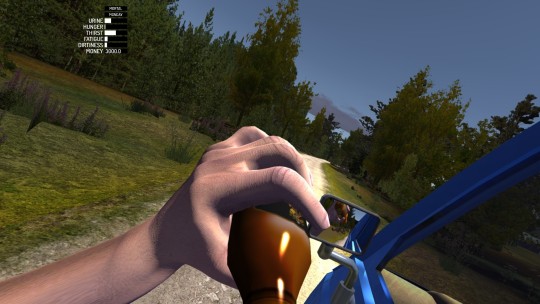
So, I know what you’re probably thinking seeing this game on my list. This has gotta be a joke, right? Nobody would enjoy this clunky, bizarre mess of a game enough to have it on their game of the year list, right?
Believe me, I felt similarly when I first started playing My Summer Car. The premise and all the pre-release trailers almost made it feel like a joke game, like your Surgeon Simulators or your Goat Simulators. But at some point during my time with My Summer Car, it stopped being a joke for me.
At least not entirely. It’s still a game with a dry, distinctly Finnish sense of humor, but the crude humor almost belies the game’s mechanical depth. When you’re putting your car together, you literally have to put your car together, piece by piece, bolt by bolt. It’s strangely therapeutic to put your digital hoopty together. There’s a real sense of accomplishment once you finish your build and fire your car up for the first time.
What’s great is the fact that your car will always kind of be a piece of shit in My Summer Car. When I first started my car up after my initial build, the car kept making a horrifying grinding sound. Also it was eating through brake fluid like nobody’s business. It felt like I was really struggling to put a piece of shit old car into a semi-drivable state.
It’s an extremely janky game for sure, but its intricate car building mechanics punctuated with bizarre Finnish pop songs and copious amounts of drinking make My Summer Car legitimately one of the most unique video games I’ve ever played. I can’t wait to see it come out of early access.
5. Motorsport Manager
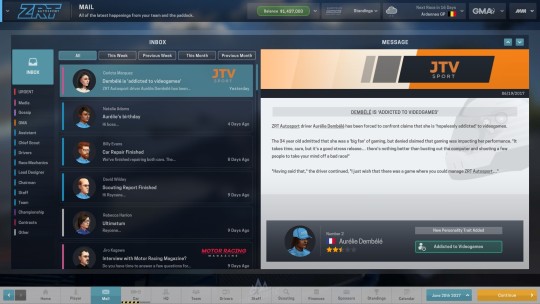
In a lot of ways, Motorsport Manager is the game I’ve wanted to make for years. Ever since I got into F1 thanks to Giant Bomb’s Alt+F1 podcast, I dreamed of a modern F1 management game that had Crusader Kings II-like traits for all the characters in the game. To be fair, there have definitely been well-received F1 management games made in the past, but Motorsport Manager is a great, modern take on the idea.
A deep set of skills and traits make a lot of the drivers that populate your game’s race world feel unique. If your driver is a bit of a primadonna, they could refuse any orders you attempt to give to them, as they want all the glory for themselves. Drivers can fall in and out of love with each other, which affects their relationships with each other as well as their performance.
It’s not just a spreadsheet game, either. Outside of the more menu driven ways you micromanage the more minute details of your team, you also manage your race strategy on the fly during the actual race. You decide when your drivers pit, as well as when they push their cars to the limit and when they ease off to conserve fuel and car part wear.
There’s a few problems I have with the game, such as the fact that, despite the game’s use of fictional drivers, the pool of rookies and drivers signed to teams at the start of the game is set in stone and not randomly generated, meaning you can just remember which drivers and staff members are good to sign at the start of every game, rather than a more dynamic hiring process that randomly generated drivers and staff would allow. There’s also a few issues the race AI has in regards to respecting blue flags, making overtakes when they have the opportunity to, and making pit stops that make sense.
But a few minor quibbles didn’t hamper my enjoyment of the game that much. The loop of the game is engrossing enough that I often found myself playing the game for hours on end without intending to, telling myself that I’d play for just one more race. It’s got some room for improvement for sure, but Motorsport Manager is pretty much everything I want out of an F1 management game.
4. American Truck Simulator
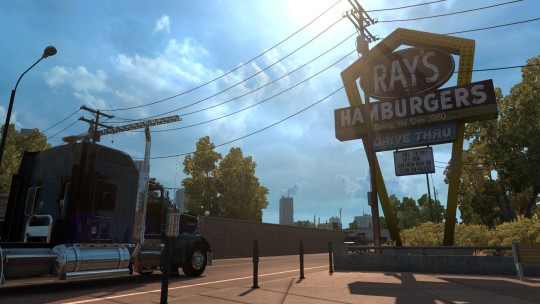
As I’ve gotten older, I’ve found myself appreciating games that embrace mundanity more and more. Games like American Truck Simulator appeal to me because I feel like it respects me enough to simply enjoy driving in the space between towns that are often ignored in games. There’s probably a million different ways that SCS Software could have made the game feel more “gamey”, like the boring racing and other types of minigames that other open world games have at such a rate that it almost feels like they are required to by law, but they didn’t. The game doesn’t cut down the long and winding roads between major cities out of a fear of a lack of excitement. Rather, it revels in those spaces.
The game currently simulates California, Nevada, and Arizona, with plans to eventually get to the rest of the country stated by the developers. Despite this relatively large area, the world of American Truck Simulator is surprisingly detailed. Little bits of personality like roadside sculptures made from propane tanks, burned out hotels with bare mattresses laid on the floor, and billboards around Las Vegas for divorce lawyers are littered all over, making the world feel more lived in than you might expect from a game like this.
It’s a game that many people describe as a “podcast game”, and while that’s not an inaccurate statement, I prefer to make a playlist of my favorite sad, slow, contemplative songs and hit the road. There’s in-game internet radio, much like Euro Truck Simulator 2, and while it’s fun to listen to hokey country music stations and the like, there’s a certain zen-like state that my mind goes to when driving down long highways and through small towns while listening to my playlist that kept me wanting to come back to this game throughout the year.
I can’t wait for them to expand the game’s map as time goes on (especially into Illinois, which is my neck of the woods), and I definitely see myself coming back to this game to explore more of this digital version of the States for a long time.
3. Stardew Valley
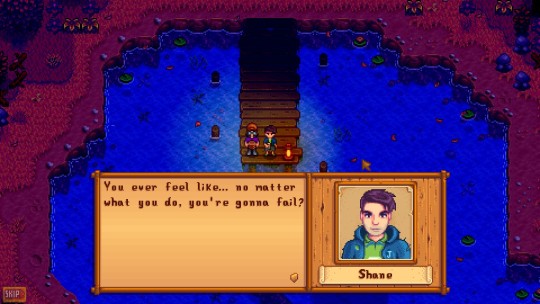
Stardew Valley came completely out of left field to me. I didn’t follow the game’s development process, only first hearing about it once it had already came out and was generating a lot of positive buzz. I didn’t play any of the Harvest Moon games before, so I don’t have any particular nostalgia or affinity for this type of game, so I wasn’t really sure if I’d like it or not. Imagine my surprise when it ended up being one of my favorite games of the year.
The game’s premise is fairly simple. You inherit a farm after your grandfather’s death, available for you to move to whenever your corporate cubicle farm job gets to be too much. After taking up this offer and setting off for the titular town, you have to turn the overgrown remains of your grandfather’s farm into something he’d be proud of, all the while making friends and lovers with the town’s residents along the way.
It’s a bit of an overly romantic view of country life as simple living, but that’s easily forgivable. The game is charming as hell, with so many different things you can do and unlock that it’s mindblowing that the game was made by one person. Throughout my time in Stardew Valley, I’ve never felt like I didn’t have anything to do. Quite the opposite in fact, as I usually felt like there was a glut of different things I could do at any given time, even after sinking dozens of hours into the game.
I’m a sucker for games with a lot of heart and empathy in them, both of which are qualities that Stardew Valley possess. There’s really humanizing moments to be had with characters that are homeless, suffer war-induced PTSD, alcoholism, depression, and more. The game doesn’t really turn its nose up at many of the characters and make them 100% irredeemable assholes, even if they might appear that way at first glance.
Given that it appears that I haven’t even seen close to what the game offers combined with the fact that the game keeps getting additional content added in via updates, I can see myself getting lost in Stardew Valley well into the new year and beyond.
2. Overwatch
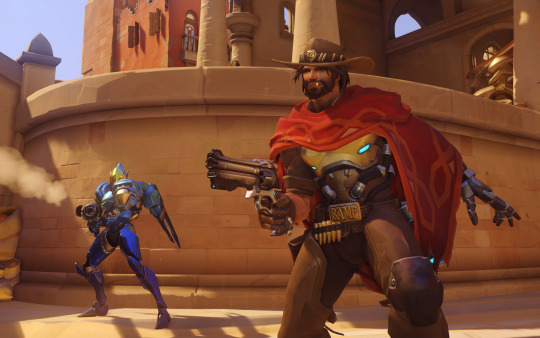
I’ve kind of fell off competitive shooters as I’ve gotten older. I used to play games like Halo and Rainbow Six: Vegas all the time when I was younger, but their appeal to me waned after high school. I’ve definitely put some time into a few of them over the years, especially after getting my own gaming PC a few years back, but not like I used to.
Because of that, I wouldn’t exactly say that I’m surprised by how much I enjoyed Overwatch, but it’s the most I’ve enjoyed a competitive shooter in years. Nearly everything about the way the game is designed seems like it was made to minimize the feeling of letting your team down that turns many away from competitive shooters. The game rarely highlights your shortcomings to your team, instead opting to show everyone the best play of the game and several cards with the players that did the best at the end of every match.
The different heroes in the game (which are basically just classes) not only give you many different ways to play the game, but also inject lots of personality into the game as well. It doesn’t too long of searching through any social media site’s gaming tag to find the myriad of fan art and jokes that build off of the different personalities that inhabit the world of Overwatch.
There’s also been a good amount of post-release content as well, with new heroes and new maps joining the fray at a pretty frequent rate. It’s enough to get me back into competitive shooters and make Overwatch one of my favorite multiplayer shooters in recent memory.
1. Hitman
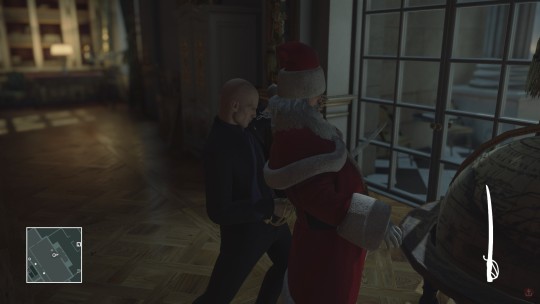
After 2012’s Hitman: Absolution failed to recognize what made previous games in the franchise so good, I cynically thought there’d never be another good Hitman game. I was so sure that games like Hitman: Blood Money could never be made in the modern games industry, at least not with the budget and team size needed to make it truly great. So if anything, Hitman has taught me to not be so cynical about the state of the games industry, as it is an incredible game.
With it, IO Interactive has found a way to have their cake and eat it too in regards to being both highly accessible for players new to the franchise and deep enough to hold the interest of veterans to the series. The challenges system is the perfect introduction to both any given map as well as the game’s mechanics, guiding you step-by-step through a hit designed by the developers. The brilliance of it is that through tackling these different challenges, you naturally learn the intricacies of the map and how the systems in the game interact through doing, not through some more boring and traditional tutorial system.
The masterful design doesn’t stop at the challenges system, either. Each map is designed to be just one or two steps away from mayhem, just waiting for you to spring the trap like a murderous game of Mouse Trap. And even where the designers didn’t intend for chaos to unfold, there’s enough of a variety of tools at your disposal to create your own brand of murder wherever and whenever you’d like.
While the episodic nature of the game was much maligned prior to its release, it actually ended up being one of the game’s strongest suits. The steady trickle of escalation missions and elusive targets punctuated by new map releases gave me plenty of reason to keep coming back to the game throughout the year. It makes the case for the episodic release structure better than any other game I’ve ever seen.
Speaking of elusive targets, I can’t end this piece without mentioning how incredible of an idea they are. For the uninitiated, they are one-time assassinations that are available only for a limited window of (real-life) time that you only have one chance to complete. If you mess it up or miss the window, it’s gone forever. This elimination of the safety net of save scumming and infinite retries makes elusive targets some of the most intense and rewarding things I’ve done in a video game all year. There aren’t many words that can describe the feeling of coming up with a plan and executing on it perfectly, all the while knowing that any slight misstep will lock you out of any future attempts and permanently mark your failure on your record.
Top to bottom, Hitman is a masterstroke of game design that not only lives up to the name of previous entries in the series, but far surpasses them. And with the prospect of a season two nearing us, it seems like the fun times in this world of assassination are just beginning.
#my posts#text#video games#game of the year 2016#writing#death road to canada#superhot#dragon ball xenoverse 2#pokemon sun and moon#stellaris#my summer car#motorsport manager#american truck simulator#stardew valley#overwatch#hitman
0 notes